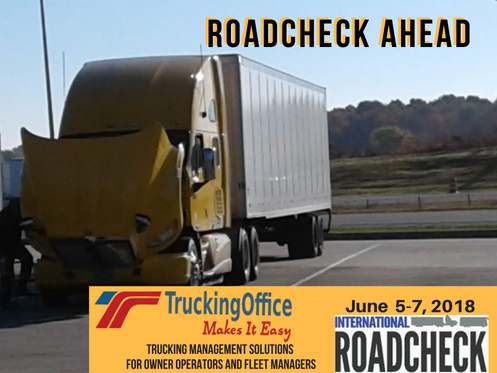Just a few weeks away and the CVSA Roadcheck Blitz will be interrupting your time on the road. Nobody’s very excited about that.
What’s this year’s focus? Hours of service regulations.
That means your ELD had better be working perfectly and your records neat and tidy.
What’s Covered in the CVSA Roadcheck Inspection?
Have you ever gone to the Roadcheck website to see what their inspection procedures are? Check out what they intend to be checking out on this page. That’s a lot of work they want to do on every vehicle.
I think the only way to deal with that type of examination of my rig is to prepare for it all year long. When I keep my rig in good shape, it doesn’t matter when the Roadcheck is held because I’m ready for it. They’re not going to find much wrong if a rig is well-maintained all year long.
Regular weekly inspections that we should be doing can show us potential problems, but it’s smart to track your miles to be sure that some systems get checked – like the brakes – and some equipment – like the tires – get replaced before they cause a breakdown on the road. There are plenty of checklists that you can find on the internet. Google truck inspection forms and you’ll find a hundred or more. This one is clear and lets you track what you’ve done and what still needs to be addressed.
Hide or Seek?
There seem to be two ways to deal with the Roadcheck: hide from it by staying off the road during those three days in June, or get it over with as quickly as possible.
I know customers who remember who declined loads. Those truckers lose a lot of trust from those shippers. Regular customers don’t understand why a trucker doesn’t want to haul during those days. They see it as if a trucker is trying to hide the condition of the equipment because they don’t trust it to pass the examination. In places where cars are expected to pass inspections to get their tags renewed, the trucker who refuses to face an inspection looks like they’re cheating or something.
Granted, these people do not understand the complications of the Roadcheck. The extra time spent waiting for the inspection is time we’re still on the HOS clock but not covering miles costs us – sometimes a lot of money as we end up making our delivery late. The shippers don’t see the whole story.
That’s why keeping my rigs up to date on maintenance was so important to me. I wanted to get that inspection over as quickly as possible and get back on the road.
Maintenance Records and Scheduling
Tracking time and mileage for the various systems and equipment on a rig can be a challenge. The simplest solution is to let a computer do it all for you. If you enter the basic data for an invoice into your computer and let it set up the routing, it’s just one more thing that a computer can do for us to make our jobs as truckers or fleet managers easier. Let our computer tell us when the oil needs to be changed and we can arrange for it to be done on our schedule, not as a stop that’s eating up our HOS. We can get work done by mechanics we trust, not by the guy who comes in the tow truck when we have a breakdown on the road.
Even if there weren’t a Roadcheck, I’d still want to keep my rig in the best possible condition. I take pride in my ride. I have to spend a good portion of my life in that machine – I want it to be comfortable and safe.
That’s why I insisted that TruckingOffice trucking management solution include a maintenance module that tracks miles and time. It’s the only way to be sure that everything is taken care of right.
The the Roadcheck is nothing more than an inconvenience – nothing to be nervous about.
You can have that confidence too, if you’re using TruckingOffice. Give our free trial a chance to show you how you can get ready for the Roadcheck next month.







Recent Comments